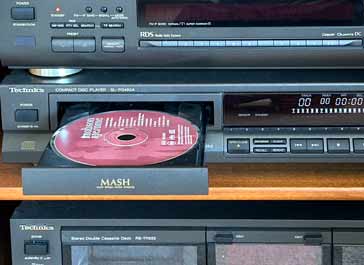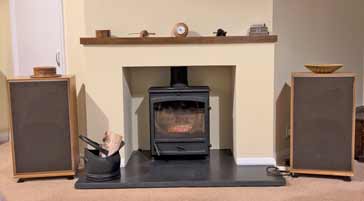Advantages of Compact Discs CDs Today
Even in these days of music streaming and the vinyl revival, CDs still have their place as sales increase.
Compact Disc, CD, Technology Includes:
Advantages of CDs today
Even with the abundant and convenient use of streaming music and the vinyl revival, CDs still have their place for modern music listening.
Although the technology was invented back int he 1970s, CDs still provide one of the best ways of listening to music.

Yes, CDs have disadvantages, but in many areas their advantages can outweigh the disadvantages and mean that they are still the best option for a number of scenarios.
There are several reasons why CDs are relevant today. We'll take a look at some of the reasons and also balance this with some of the disadvantages.
CD quality
One of the main reasons why CDs are still king is the quality. The data is not compressed.
Streaming services need to ensure that the music is contained within a certain bandwidth to allow users to utilise the service on the move as well as at home via a Wi-Fi connection.
If users are on the move, then they need to remain within their data allowances, and also when connections are poor, the data rate needs to be minimised. To ensure the music can be successfully streamed it has to be compressed.

In many cases this may not be noticeable, but on a high quality system, many people can detect a large difference.
Also analogie systems far little better. For any vinyl record system the top frequencies that can be reproduced by the stylus and cartridge is limited - often to well below 20kHz. Also the distortion levels introduced by the physical size of the stylus compared to wavelengths of vibrations in the grove, and the offset of the tracking angle mean that distortion can be high.
Analogue tape systems also have their imperfections, especially compact cassettes that are also seeing a revival. Frequency response and distortion along with wear of the tape and the heads mean that most music is far from perfect.
Contrast this with CDs which do not have the audio compressed, and with a sampling rate of 44.1 kHz and 16 bits per sample, give a sound quality that cannot really be distinguished from reality.
The quality provided by CDs is unsurpassed and coupled with the robustness of the discs, they are ideal for home listening.
Physical medium
Although streaming provides a virtually unlimited choice of music, there is a certain satisfaction about paying for the music only once.
Once the CD has been bought, you have it for as long as you want - there's no monthly premium.
In this way it is possible to build up a collection of the music you want, and it can be a truly personal collection.
CD inserts
Another advantage is that you get an insert - the equivalent of the sleeve for vinyl albums.
Not only is the insert often a work of art, but there can also be great details about the music. Many classical and other inserts will contain details about the composer, the actual music, the recording and the performers.
The same level of detail is not available on streaming services, so this is a great advantage for CD collectors - it makes the music more personalised, intersting and it brings you closer to the performance.
Controllable budget
Collecting CDs can work very well for those on a budget. Once the CDs have been bought you can keep them for as long as you want.
When a collection has been built up over time it gives you all of this music when you want - no further payments.
The CDs can be bought as and when cash is available. Contrast this with the streaming services where there is a monthly fee. No fee no music!
Better support for creators
CDs give much better support to the artists who write, and perform the music.
Streaming services are renowned for paying only small amounts to the artists. Although streaming services can notch up huge numbers of plays, they still only pay a small amount to the artists.
Yes, the business models have changed to accommodate this, but giving a pair proportion of the receipts to the artists supports them and creates a strong and healthy music industry.
Ripping CDs
Another advantage of CDs is that you can rip them onto another digital format. MP3 players, iPods and the like are still as good as ever and give the opportunity to listen to your music while you are on the move.
You can also select the form of encoding and compression you want to many of these players. SO while the quality won't be as good as the original CD, you can have a choice of the compression.
There's also the possibility to store the CDs on a large home based disc drive for easy retrieval and later playback. These large systems can store the CDs without compression, so nothing of the quality is lost.
Downsides of CDs
There are naturally a few downsides to collecting CDs. These need to be weighed against the advantages to see what is the best way forward.
Space required for the collection: When a CD collection is amassed, it will require space for storage. This can be a feature in the room where it is housed, but it is a consideration for collections, especially as they become larger.
Availability: With streaming and vinyl becoming the major formats today, not all music will be available in the way that it was.
No CD shops: The days of the high street shops selling CDs are virtually over. Most CDs need to be bought online and this takes away some of the mystique and enjoyment of buying new music. That said a few specialist shops are springing up.
Less convenience: In these days of streaming, it is very easy to start streaming music of a particular type and just leave it playing. CDs require changing after they are finished, although ripped CDs can be made into a playlist if needed.
Not so good for portable: Compact discs have never been good for portable or mobile use where there is plenty of vibration and sudden jots. The compact cassettes and their Walkmans and the like as well as the MiniDisc were far superior for this use.
These are a few of the downside points to think about when setting up a CD collection.
Playing CDs is coming back into vogue more than it was a few years ago. Although vinyl sales are rising significantly, it is now being found that CD sales have bottomed out and are starting to rise again.
When considering using CDs it is necessary to look at both the advantages and disadvantages of playing CDs and building up a collection. See what works for you.
For myself, I still enjoy the really clear crisp sound that comes from a CD, without the mush of compressed recordings and with the clear, virtually noise free, rumble free, click free and full frequency range sound.
 Written by Ian Poole .
Written by Ian Poole .
Experienced electronics engineer and author.
More Audio Video Topics:
HDMI
SCART
DisplayPort
DVI
Loudspeaker technology
Headphones & earphones
Bluetooth speakers
Stereo sound
Microphones
Audio compact cassettes
Vinyl record technology
Digital radio
DVB television
Return to Audio / Video menu . . .


